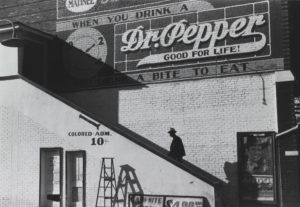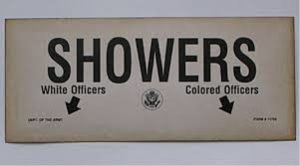 In the summer of 1918, the all-black 92nd Infantry Division was training at several U.S. military installations in preparation for shipping out to France to fight in World War I. Because some of these training sites were located near U.S. cities where segregation was strictly enforced, military brass was concerned about what might happen when soldiers not used to segregation visited
In the summer of 1918, the all-black 92nd Infantry Division was training at several U.S. military installations in preparation for shipping out to France to fight in World War I. Because some of these training sites were located near U.S. cities where segregation was strictly enforced, military brass was concerned about what might happen when soldiers not used to segregation visited  these cities. Because, at that time the U.S. military itself subscribed to many racist attitudes, it did not take a principled stand against the segregationist policies of these southern cities. Instead, on March 28, 1918, General Charles C. Ballou issued the following shameful order:
these cities. Because, at that time the U.S. military itself subscribed to many racist attitudes, it did not take a principled stand against the segregationist policies of these southern cities. Instead, on March 28, 1918, General Charles C. Ballou issued the following shameful order:
Headquarters 92nd Division
Camp Funston, Kansas, March 28, 1918
- It should be well known to all colored officers and men that no useful purpose is served by such acts as will cause the ‘color question’ to be raised, It is not a question of policy, and any policy that tends to bring about a conflict of races, with its resulting animosities, is prejudicial to the military interest of the 92nd Division, and therefore prejudicial to an important interest of the colored race.
- To avoid such conflicts the division commander has repeatedly urged that all colored members of his command, and especially the officers and noncommissioned officers, should refrain from going where their presence will be resented. In spite of this injunction, one of the sergeants of the Medical Department has recently precipitated the precise trouble that should be avoided, and then called upon the division commander to take sides in a row that should never have occurred, and would not have occurred had that the sergeant placed the general good above his personal pleasure and convenience. The sergeant entered a theater, as he undoubtedly had a legal right to do, and precipitated trouble by making it possible to allege race discrimination in the seat he was given. He was strictly within his legal rights in this matter, and the theater manager is legally wrong. Nevertheless the sergeant is guilty of the greater wrong in doing anything, no matter how legally correct that will provoke race animosity.
- The division commander repeats that the success of the division, with all that success implies, is dependent upon the goodwill of the public. That public is nine-tenths white. White men made the division, and they can break it just as easily if it becomes a troublemaker.
- All concerned are enjoined to place the general interest of the division above personal pride and gratification. Avoid every situation that can give rise to racial ill will. Attend quietly and faithfully to your duties, and don’t go where your presence is not desired.
- This will be read to all organizations of the 92nd
By Command of Major-General Charles C. Ballou
This post was extracted from my historical novel A Place near the Front, a story based on the World War I exploits of Gordon Herbert, a bronze warrior who lived through many events such as the one described above.